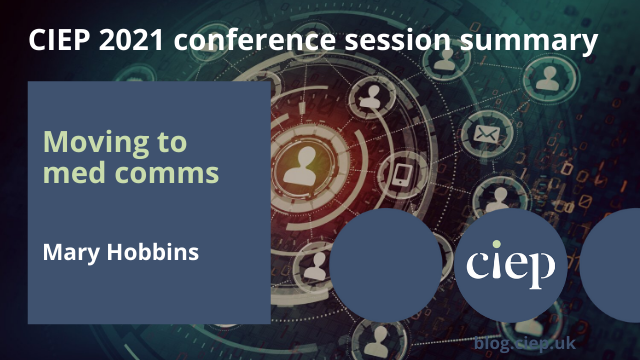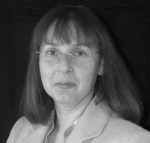This year’s CIEP conference was held online, from 12 to 14 September. Attendees from all over the world logged on to learn and socialise with their fellow editors and proofreaders, and a number of delegates kindly volunteered to write up the sessions for us. Mary Hobbins reviewed Moving to med comms, presented by Alison Hillman and Liz Jennings.
 What is med comms?
What is med comms?
These hugely experienced medical editors first met at the then Society for Editors and Proofreaders (SfEP) conference in 2019 and currently work in-house for global med comms consultancies (Oxford PharmaGenesis and Lucid Group, respectively). They described how working in medical communications covers a broad range of services from publication planning, journal articles and drug monographs to commercial, marketing and training materials. Freelance opportunities include design, project management and writing as well as editing and proofreading.
What are the attractions of working in med comms?
Both agreed that this is a growing industry with an ongoing need for freelance and in-house editors. They shared a short film that gave some insight into the various in-house roles and included colleagues talking about the appeal of this area of work and what they get out of being in med comms (interesting content/ variety in subjects and project types/ high standards/ innovation/ autonomy/ part of a collaborative team/ energising environment).
Liz described some of the in-house benefits: career progression, personal development and training, good rates of pay, flexibility in working hours and opportunities to work from home (which has accelerated since the pandemic). Freelancer benefits include the interesting variety of work available, long-term collaborative relationships and being a part of producing purposeful, beneficial material (a poll they ran on current pay bands suggested that most of the participants fell into the £25–£30ph range for both editing and proofreading).
What background do you need?
Some med comms companies prefer a science degree; others are happy if you have a language or arts-based degree and/or previous scientific experience. Alison emphasised that you should be willing to work to tight deadlines, have both editing and proofreading skills and be proficient in PowerPoint. You must also be willing to undertake an editorial test, whatever your experience, and this is likely to take the form of two tasks: an editing task and either a PowerPoint reformatting and checking task or a proofreading task.
However, she stressed the most important attribute is enthusiasm!
How do you find work in this area?
The first aspect they both noted was that it doesn’t matter where you are based in the world – this might actually be helpful to meet tight deadlines! If you aim to become an in-house employee, do your research for the kind of employer that you would like to work for and approach them about available openings. Use LinkedIn to locate likely organisations to approach as well as scanning job listings on the platform. For freelance opportunities, the MedComms Workbook website lists freelancers for a subscription. If you have an entry in the CIEP Directory, make sure your qualifications and/or experience are clear so that med comms organisations can find you with keywords.
Keep up to date with what’s going on in med comms. The CIEP Medical Editing training course is well worth investing in, if you haven’t already, as this is highly regarded in the industry. You could also explore some e-learning courses on LinkedIn, Udemy, etc (some are free) and join the Facebook medical editors group. Another free source of information is the Association of British Pharmaceutical Industries (ABPI) website and Code of Practice, which gives guidelines on use of language in med comms materials.
Don’t wait for potential opportunities to come to you – be proactive and make contact. Express your readiness to do an editorial test to work with your preferred clients; network and follow up any previous contacts you may have in the med comms industry.
Alison and Liz displayed two practice exercises to try (a slide and a figure) with a litany of problems to think about; they discussed some dos and don’ts of language (based on the ABPI’s Code of Practice) and rounded off their session with a thought-provoking list of some terms to watch out for and understand (eg efficacy vs effectiveness; incidence vs prevalence; seriousness vs severity).
 Mary Hobbins is an Advanced Professional Member of the CIEP providing editorial services to commercial businesses and publishers of academic journals, professional textbooks and training materials. When not working, she often finds herself riding pillion somewhere in southern England.
Mary Hobbins is an Advanced Professional Member of the CIEP providing editorial services to commercial businesses and publishers of academic journals, professional textbooks and training materials. When not working, she often finds herself riding pillion somewhere in southern England.
 About the CIEP
About the CIEP
The Chartered Institute of Editing and Proofreading (CIEP) is a non-profit body promoting excellence in English language editing. We set and demonstrate editorial standards, and we are a community, training hub and support network for editorial professionals – the people who work to make text accurate, clear and fit for purpose.
Find out more about:
Posted by Abi Saffrey, CIEP blog coordinator.
The views expressed here do not necessarily reflect those of the CIEP.
